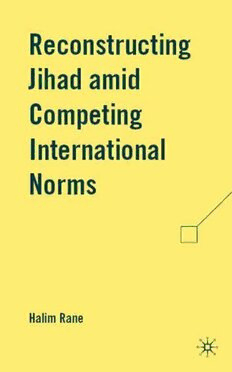
Reconstructing Jihad amid Competing International Norms PDF
254 Pages·2009·1.542 MB·English
Most books are stored in the elastic cloud where traffic is expensive. For this reason, we have a limit on daily download.
Preview Reconstructing Jihad amid Competing International Norms
Description:
Halim Rane’s Reconstructing Jihad breaks new ground on some of the most crucial issues of the twenty-first century: the role of religion in international affairs, the use of armed force, and the achievability of a just peace. In the context of international norms and identity factors Rane presents a contemporary methodology for the reconstruction of jihad from a doctrine based on the use of armed force to one that gives ‘Islamic’ legitimacy to non-violent resistance. Using the Israel-Palestine conflict as a case study, this book explores the impact of competing international norms in the process of conflict resolution. Combining a constructivist perspective of international relations with contextualist and objective-oriented (maqasid) approaches of Islamic Studies, the author examines the conditions under which a just resolution of the Israel-Palestine conflict is possible. Based on extensive research and statistics, Rane demonstrates why Palestinian nonviolence would be more conducive to their liberation struggle than violent resistance and how this is a legitimate and authentic form of jihad consistent with the higher objectives of Islam – a necessary realization for Islamic militants if the conflict is to find a just resolution. With the continued failure of the conventional ‘peace process’ and the increasing intractability of the conflict, this book makes a timely contribution to resolving one of the world’s most enduring dilemmas.
See more
The list of books you might like
Most books are stored in the elastic cloud where traffic is expensive. For this reason, we have a limit on daily download.
